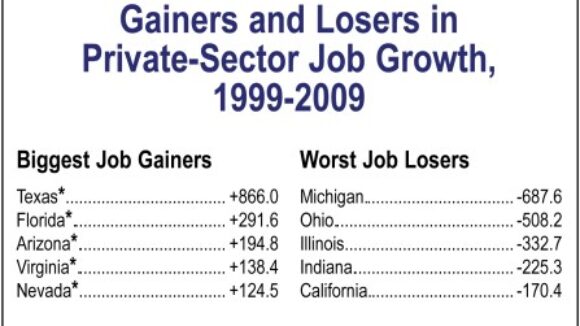'Decade of Decline' in Private-Sector Jobs
Forced-Unionism State Employment Down by 1.9 Million Since 1999
(Source: April 2010 NRTWC Newsletter)
Recently, millions of Americans have been dismayed by reports, based on official U.S. Labor Department Bureau of Labor Statistics (BLS) data, that from 1999 through 2009 our country endured a "lost decade" in private-sector employment.
In this context, the term "lost decade" refers to annual BLS statistics showing that in 2009 there were 107.95 million private-sector jobs nationwide, roughly 370,000 fewer than in 1999, when there were 108.32 million.
This marks the first time since the Great Depression that an entire decade has gone by with negative net growth in private-sector employment across the U.S.
However, some of the 50 states have fared far better than others over the past 10 years. And a review of how each state's job market performed suggests that the U.S. Congress could dramatically improve America's employment prospects for the next decade by adopting one simple change in federal labor policy.
Private-Sector Employment in Right to Work States up by 1.5 Million Since 1999
Current federal labor law authorizes and promotes the payment of compulsory union dues and fees as a condition of getting or keeping a job.
Under pro-forced unionism provisions in the 1935 National Labor Relations Act (NLRA) and the 1951 amendments to the Railway Labor Act (RLA), an estimated 6.6 million private-sector employees must pay dues or fees to their Big Labor monopoly-bargaining agent, or face termination from their jobs.
At the same time, thanks to many years of vigilant efforts by freedom-loving Americans, federal labor law continues explicitly to recognize states' option to protect employees from forced union dues and fees by adopting Right to Work laws.
Currently, 22 states have Right to Work laws on the books prohibiting the firing of employees simply for exercising their right to refuse to join or bankroll an unwanted union.
A huge majority of the 22 Right to Work states actually experienced net gains in private-sector employment from 1999 through 2009. Overall, private-sector employment in Right to Work states is up by roughly 1.5 million since 1999.
Meanwhile, the 28 forced-unionism states collectively endured a "lost decade" in employment growth far more bleak than that of the nation as a whole. In these states, private-sector employment is down by 1.9 million since 1999.

